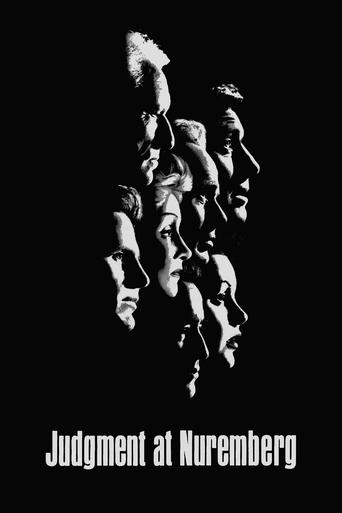El evento que el mundo nunca olvidará
"Judgment at Nuremberg" (1961), a poignant and thought-provoking film produced by United Artists and Roxlom Films, delves into the moral complexities of post-World War II Germany. Directed by Stanley Kramer, the film is set during the Nuremberg Trials, where American judges preside over the cases of Nazi war criminals. The narrative centers on Judge Dan Haywood, portrayed masterfully by Spencer Tracy, who must navigate the delicate balance between justice and the political pressures of the emerging Cold War. As Haywood grapples with the enormity of the crimes committed and the human stories behind them, the film raises profound questions about guilt, responsibility, and the nature of justice itself. The film's strength lies in its ensemble cast, which includes stellar performances by Burt Lancaster, Richard Widmark, Marlene Dietrich, and Judy Garland, among others. Lancaster's portrayal of a former Nazi judge, Ernst Janning, is particularly compelling as he wrestles with his past actions and the realization of his complicity in the atrocities. The courtroom scenes are intense and emotionally charged, with Maximilian Schell delivering a riveting performance as the defense attorney, Hans Rolfe, who challenges the court's authority and the moral high ground of the Allied powers. These performances, combined with Abby Mann's powerful screenplay, create a gripping narrative that keeps the audience engaged and reflective. "Judgment at Nuremberg" also stands out for its historical accuracy and its unflinching look at the moral ambiguities of the post-war period. The film does not shy away from depicting the devastation of Germany and the lingering anti-Semitism that persisted even after the war. It explores the difficult choices faced by ordinary Germans who were caught up in the Nazi regime, as well as the challenges of rebuilding a nation while seeking justice for its crimes. The film's black-and-white cinematography adds to its somber tone, effectively capturing the gravity of the subject matter and the moral dilemmas at its core. Ultimately, "Judgment at Nuremberg" is more than just a courtroom drama; it is a profound meditation on the human condition and the enduring struggle for justice. The film's relevance extends beyond its historical context, as it continues to resonate with contemporary audiences grappling with similar issues of accountability and moral responsibility. By presenting a nuanced portrayal of the Nuremberg Trials, the film challenges viewers to confront the uncomfortable truths of history and to consider the ongoing implications of those events on our world today.
Año1961
Presupuesto3000000$
Duración191 minuto
Ingresos10000000$
GénerosDramaBélicaHistoria
Países de producciónUnited States of America

